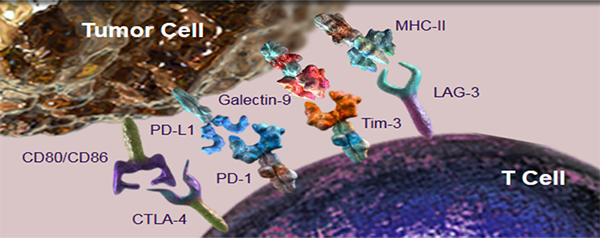Cancer Immunotherapy And Immune Checkpoint Inhibitors
| The development of cancer is a complex process in which the physiological balance of the organism tilts towards dysregulation. Indeed, the term cancer englobes a collection of related diseases that can start almost anywhere in the body. Usually, the cells in an organism grow and divide, forming new cells as needed to replace damaged and old cells that die. When abnormal cells that should die survive, or divide without control, a tumor develops (if it happens in a mass of tissue). | |
| Tumors can be benign or malignant. With the brain being an exception, benign tumors usually are not life-threatening, whereas malignant tumors are. Eventually, malignant tumors can break away from the tissue of origin and proliferate in a distant organ. This process is called metastasis and represents an advanced state of the disease. | |
| As a disease associated with the physiological process of cell cycle, cancer has existed as long as complex organisms have been living, even before humans existed. Yes, researchers have found cancer in bones from dinosaurs!1 The first written description of the disease was found in Egypt, 3000 BC2, and the use of the word Cancer is credited to Hippocrates. Hippocrates was a Greek physician who lived from 460 to 370 BC, and is considered the father of modern medicine. He first used the word karkinos (or carcinus), which in Greek bears reference to a crab. The term was later on translated to cancer, the Latin word for crab, by a Roman physician, Celsus, and was finally popularized by another famous Greek doctor, Galen. Galen was also the first one to use the word oncos (meaning swelling), which has remained as part of the modern medical terminology in the field. | |
| Today, cancer remains as one of the main causes of death worldwide. In the US, cancer is only second to cardiovascular diseases as the leading cause of morbidity and mortality. Lung and bronchus are the most common cancers, which are probably related to smoking, along with other genetic and environmental factors3. | |
| In the last few decades, the treatment of cancer has experienced significant advancement, to the point that the success rate for some of them is relatively high. For example, 29% of patients diagnosed with breast cancer survive 5 years after being diagnosed and treated4. Today, about 10 different types of treatment can be found, but among the most widely used are surgery, chemotherapy, radiotherapy, tissue transplant, and more recently, immunotherapy. | |
| Although most people that suffer the disease will undergo some sort of surgical procedure, the choice of treatment, either single or in combination, depends on multiple factors. Furthermore, the better we understand the disease, the better the tools we develop to combat it become. That is the case of immunotherapy in recent years. As its name indicates, immunotherapy is focused in manipulating the immune system to combat the disease using the body’s natural immune response. The process of eliciting a T-cell mediated immune response, either to eliminate a foreign antigen or an abnormally proliferating cell, is also associated with mechanisms of self regulation that ensure this immune response doesn’t grow out of control. These regulatory mechanisms are largely controlled by molecules that researchers have termed immune checkpoint receptors. Tumor cells communicate with these receptors to trick the immune response into suppression, allowing the tumor cell freedom to grow without immune cell intervention. |
|
 |
|
| By targeting these molecules with monoclonal antibodies, we ensure that the T cells stay in an activated state, promoting a sustained response against the cancer cells. Using this approach, the results of modern immunotherapy are truly remarkable. Several drugs have been developed, and some are already approved by the FDA5. The progress in the field has been propelled by the availability of research monoclonal antibodies and reagents, that help in the study of the disease and its mechanisms. Often times, researchers need very large volumes of high-quality antibodies to prove or disprove a hypothesis. To help achieve this, BioLegend has introduced the GoInVivo™ product line. Some of the advantages of these products are: | |
|
|
| We certainly hope that the large volume of pathogen-tested, high-quality antibodies, offered at affordable prices will help researchers in their cancer studies. So, if you have any comments regarding the immune checkpoint receptors, or simply have a suggestion or request, just drop an email: mtam@biolegend.com. |
|
| References: | |
Contributed by Miguel Tam, PhD. |
|
 Login/Register
Login/Register 






Follow Us